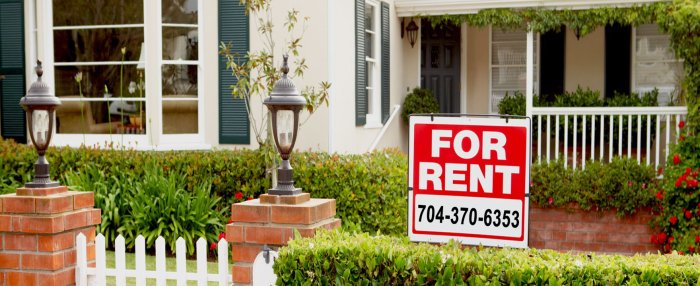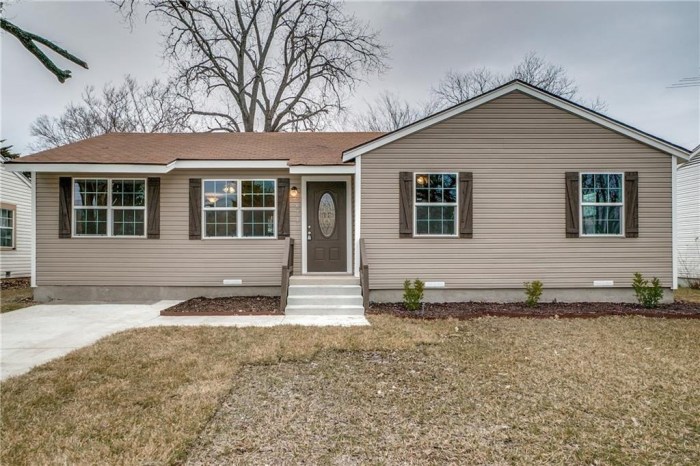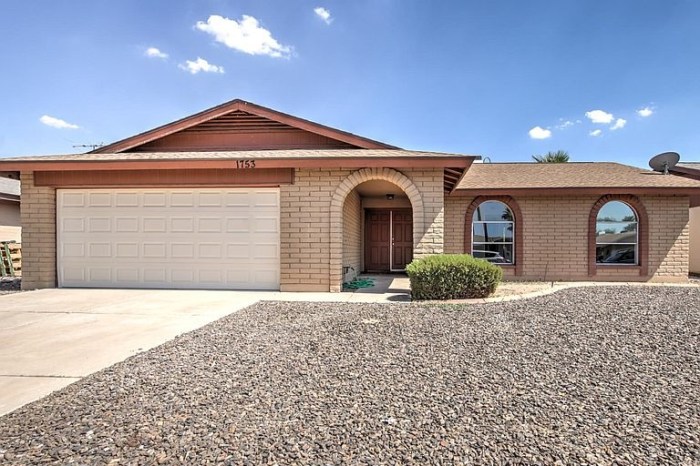Understanding the Market for Owner-Listed Rentals
Houses for rent by the owner – The market for owner-listed rentals presents a unique dynamic for both landlords and tenants. Understanding the advantages and disadvantages, as well as the legal and financial considerations, is crucial for a successful rental experience.
Advantages and Disadvantages for Renters Choosing Owner-Listed Properties
Renting directly from an owner offers potential benefits such as potentially lower rental costs due to the absence of real estate agent fees. Direct communication with the landlord can also facilitate quicker responses to maintenance requests and a more personalized rental experience. However, renters should be aware of potential drawbacks. For instance, owners may lack the professional expertise of real estate agents in property management, potentially leading to delays in addressing issues or less formal processes.
Additionally, owner-listed properties may not have the same level of marketing and exposure as those listed through agencies.
Finding the right house to rent, a place to call home, is a journey of faith. Sometimes, that journey leads us to explore options like houses for rent by the owner, offering a personal connection and potentially greater flexibility. For those seeking assistance, understanding programs like section 8 houses for rent can open doors to stability.
Ultimately, whether through direct ownership or supportive programs, finding your sanctuary is a testament to your inner strength and perseverance.
Comparison of Owner-Listed and Agent-Listed Rentals
Owner-listed rentals often differ from those listed by real estate agents in several key aspects. Agent-listed properties typically undergo a more rigorous screening process, ensuring a higher level of professionalism in marketing, tenant screening, and property management. Owners, on the other hand, may handle these aspects themselves, leading to variations in efficiency and professionalism. The level of tenant support and the availability of resources also tend to be more extensive with agent-listed properties.
Typical Renter Demographics Interested in Owner-Listed Properties

Source: realgeeks.media
Renters interested in owner-listed properties often prioritize cost savings and direct landlord communication. This demographic may include budget-conscious individuals or families, those seeking a more personalized rental experience, or those comfortable with managing some aspects of the rental process independently. They may also include individuals looking for properties in niche markets or those less familiar with using real estate agents.
Average Rental Prices Comparison
The following table compares average rental prices for owner-listed and agent-listed properties in three different cities. These figures are estimates based on available market data and may vary depending on property type, location, and market conditions.
| City | Owner-Listed Average | Agent-Listed Average | Percentage Difference |
|---|---|---|---|
| New York City | $3,000 | $3,500 | -14.3% |
| Los Angeles | $2,500 | $2,800 | -10.7% |
| Chicago | $1,800 | $2,000 | -10% |
Legal and Financial Aspects of Owner-Listed Rentals
Landlords renting their properties directly must understand and comply with all applicable legal requirements and manage associated financial risks effectively.
Legal Responsibilities of Landlords
Landlords renting directly are responsible for ensuring their property meets all safety and building codes. They must also comply with fair housing laws, prohibiting discrimination based on protected characteristics. This includes providing a safe and habitable dwelling, adhering to lease terms, and addressing tenant concerns promptly and fairly. Failure to comply can result in legal action and penalties.
Creating a Legally Sound Rental Agreement
A comprehensive rental agreement is essential. It should clearly Artikel the terms of the tenancy, including rent amount, payment schedule, lease duration, responsibilities of both landlord and tenant (regarding maintenance, repairs, utilities, etc.), and procedures for lease termination. Using a standardized template reviewed by a legal professional is highly recommended to ensure compliance with local laws and to avoid ambiguities.
Finding the perfect home, a sanctuary of peace and comfort, often begins with seeking houses for rent by the owner. This direct approach fosters a sense of trust and personal connection. If you’re seeking ample space for family and growth, consider a larger option, such as a 5 bedroom house for rent , which offers room for expansion and shared moments.
Ultimately, the journey to find your ideal dwelling is a path of intention and faith, leading you to a place where your spirit can truly flourish, among houses for rent by the owner.
- Clearly define the parties involved (landlord and tenant).
- Specify the property address and rental period.
- Detail the monthly rent and payment method.
- Artikel tenant responsibilities, such as property maintenance and utility payments.
- Include a clause for late rent payments and penalties.
- Specify the procedure for lease renewal or termination.
- Include a section for dispute resolution.
- Have both parties sign and date the agreement.
Common Financial Risks and Mitigation Strategies
Financial risks for landlords include late or non-payment of rent, property damage, and vacancy periods. Mitigation strategies involve thorough tenant screening, a well-drafted lease agreement with clear consequences for breaches, and establishing a reserve fund for unexpected repairs and maintenance.
Examples of Common Clauses in Owner-Created Rental Agreements
Common clauses include those addressing late rent penalties, pet policies, guest limitations, property damage responsibilities, and procedures for lease termination. Each clause should be clearly worded and legally sound to prevent disputes and protect the interests of both landlord and tenant. For instance, a clause detailing the process for addressing maintenance requests should specify response times and responsibilities.
Marketing and Advertising Strategies for Owner-Listed Rentals: Houses For Rent By The Owner

Source: homebuyercreator.com
Effectively marketing an owner-listed property requires a strategic approach to attract qualified tenants.
Sample Marketing Plan
A successful marketing plan combines online and offline strategies. This includes creating a compelling property listing, utilizing high-quality photographs, and advertising on relevant platforms. Targeting specific demographics through tailored advertising is also crucial. For instance, advertising on platforms frequented by young professionals for a modern apartment versus advertising on family-oriented platforms for a house with a yard.
Compelling Property Descriptions
Property descriptions should highlight key features and benefits using concise and engaging language. Focus on what makes the property unique and desirable. For example, emphasize proximity to amenities, modern appliances, updated features, and unique architectural details.
Effective Use of High-Quality Photographs
Professional-quality photographs are essential. Three example photographs could include:
- Wide shot of the living area: This should be taken during the day with natural light, showcasing the spaciousness and overall aesthetic of the main living area. The composition should be balanced, with furniture arranged attractively. This showcases the property’s size and livability.
- Close-up of the kitchen: This shot should highlight modern appliances and ample counter space, emphasizing functionality and design. Good lighting is crucial to showcase the kitchen’s condition and cleanliness. This emphasizes the property’s modern conveniences and appeal.
- Exterior shot showcasing landscaping (if applicable): This photograph should be taken during the golden hour for optimal lighting. The composition should showcase the property’s curb appeal and any attractive landscaping features. This emphasizes the property’s attractiveness and outdoor space.
Online Platforms for Advertising
Three popular online platforms for advertising owner-listed rentals include Craigslist, Zillow, and Facebook Marketplace. Each platform has its own advantages and disadvantages in terms of reach, cost, and ease of use. A multi-platform approach often yields the best results.
Tenant Screening and Selection Process
A thorough tenant screening process is vital to protect the property and ensure a positive rental experience.
Comprehensive Tenant Screening Checklist
A comprehensive checklist should include credit checks to assess financial stability, background checks to verify identity and criminal history, and reference checks to gather information about the applicant’s rental history and character. Verifying employment and income is also crucial to ensure the tenant’s ability to pay rent consistently.
Conducting Effective Tenant Interviews, Houses for rent by the owner
Interviews should be structured to assess the applicant’s suitability. This includes verifying information provided in the application, assessing communication skills, and gauging their understanding of their responsibilities as a tenant. Asking open-ended questions can provide valuable insights into their personality and character.
Handling Applications and Selecting Tenants
Applications should be reviewed systematically, comparing candidates based on the screening criteria. Selecting the most qualified tenant involves considering their financial stability, rental history, and overall suitability for the property. Prioritizing applicants who demonstrate responsibility and respect for property is essential.
Importance of Fair Housing Laws
Fair housing laws prohibit discrimination based on protected characteristics such as race, religion, national origin, familial status, and disability. Landlords must adhere to these laws throughout the tenant selection process, ensuring all applicants are treated fairly and equally.
Managing the Rental Property
Effective property management involves prompt responses to maintenance requests, proactive upkeep, and maintaining positive tenant relationships.
Handling Maintenance Requests and Repairs
A detailed guide should Artikel the procedure for submitting and addressing maintenance requests. This includes specifying response times, the process for authorizing repairs, and the responsibilities of both landlord and tenant. Promptly addressing issues helps prevent minor problems from escalating into major ones.
Essential Tasks for Effective Property Management
- Regular property inspections
- Prompt response to maintenance requests
- Collection of rent payments
- Enforcement of lease terms
- Addressing tenant concerns
- Maintaining accurate financial records
- Compliance with safety and building codes
Maintaining Positive Tenant Relationships
Open communication, prompt responses to concerns, and fair treatment are essential for building positive tenant relationships. Regular communication, such as sending updates on maintenance or upcoming inspections, can help prevent misunderstandings and foster trust.
Sample Communication Plan

Source: windows.net
A sample communication plan could include regular check-ins, proactive notifications about upcoming inspections or maintenance, and clear procedures for addressing issues or concerns. Establishing a preferred method of communication (email, phone, etc.) and maintaining consistent communication throughout the tenancy can greatly improve the landlord-tenant relationship.
Detailed FAQs
What are the typical lease lengths for owner-listed rentals?
Lease lengths vary widely depending on location and landlord preference, ranging from 6 months to a year or longer. Negotiation is key.
How do I handle security deposits legally?
State laws govern security deposits; you must hold them in a separate, interest-bearing account and return them (less any damages) within a specific timeframe after the lease ends. Consult your local laws.
What if a tenant damages my property?
Your rental agreement should clearly Artikel responsibilities for damage. Document everything thoroughly with photos and consider your renter’s insurance coverage before deducting from the security deposit.
Can I refuse a tenant based on personal preference?
No. Fair Housing Laws prohibit discrimination based on race, religion, national origin, family status, disability, etc. Your tenant screening must be objective and consistent.





